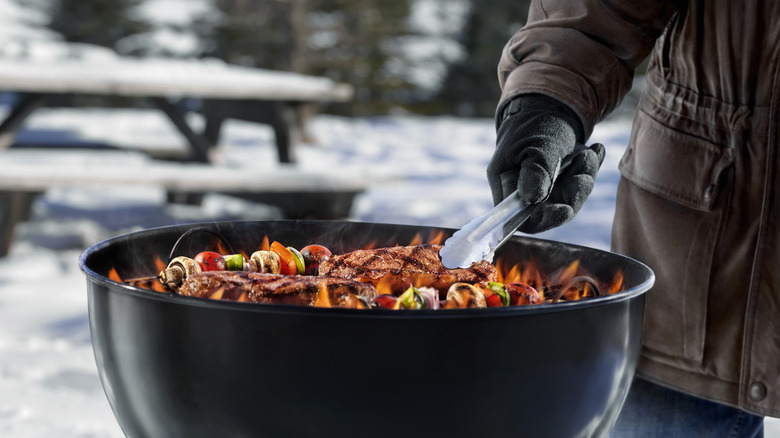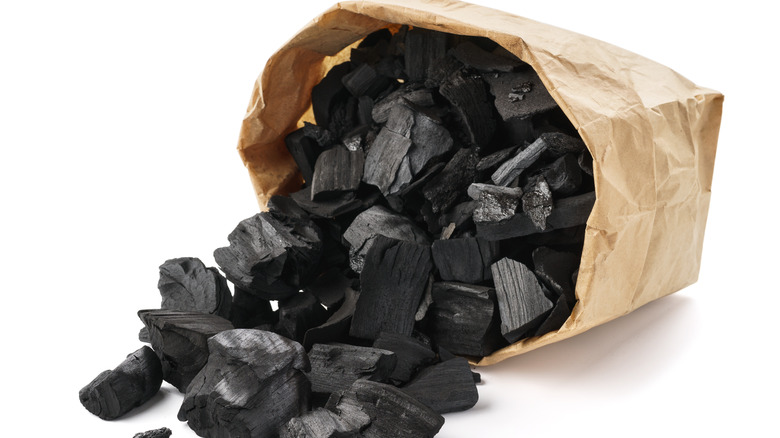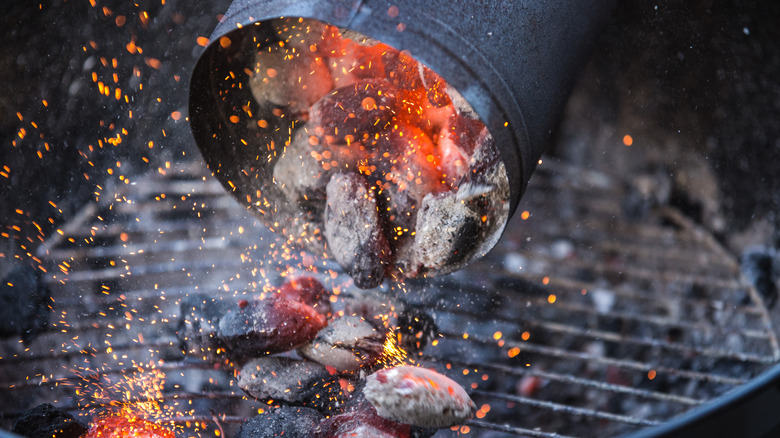The Tip To Keep In Mind When You Break Out The Grill This Winter
While it feels natural to close up the grill for the year after the summer and fall seasons wrap up, there's no rule that says you can't grill year-round. The only thing stopping you from firing up some steaks and burgers in the winter is really just whether or not you want to stand outside in the cold while you're cooking.
There are many good excuses to fire up the charcoal even when there's snow on the ground, however, with occasions like game days, house parties, and even just a lazy weekend providing rationale for a winter barbecue. If you're craving a grilled ribeye in the middle of the season, all you need is a warm coat and an extra bag of charcoal to do the trick. The coat is for you, and the extra charcoal is to fight off the cold inside the grill.
That's because, during the winter months it's harder to maintain the heat within a charcoal fire, and you'll need to keep things super hot in order to get a good sear. It will also take the grill longer to heat up when it's been sitting outside in freezing temperatures, and you won't get caught out in the cold at your tailgate. Avoid that situation with extra charcoal, and enjoy your grilled meats quicker.
More charcoal helps as the grill works harder in the winter
Grilling in the winter is a lot like grilling in the summer, except of course it's a lot colder. But, it's not just you that's cold out there huddled over the fire — the metal of the barbecue is pretty frigid, too. And that means a few extra steps are needed to fire things up.
Because the grill is so cold, it will take longer from the point when you light it to when you place your food onto the hot grates, as long as 15 minutes, and that means it'll take more fuel to get through the entire process. Once you get the grill to the right temperature, you'll have to maintain the heat because your grill is losing heat through the metal grates and airflow quicker than it would during a hot summer. Charcoal also burns faster in cold, windy weather, so you'll need more briquettes out on the patio in January.
It's also important to keep the lid covered on your grill as much as possible as you cook. You'll need to maintain this internal temperature to work just like an oven to cook your food, and the more you open the lid the longer it will take to finish. T
Stock up on charcoal in the summer to prepare for winter grilling
If you know you're going to be grilling all-year long, you might want to try to stock up on charcoal while it's readily available in stores during the summer months. Charcoal has an almost infinite shelf life as long as you store it in a dry place, so it will keep until the colder months when it can be harder to find (and more expensive). Unlike gas grills where you can do a tank swap any time of year, you can't count on being able to run out to the store for charcoal if you're running low halfway through a football game.
The best times to stock up on charcoal are the traditional grilling holidays of Memorial Day, Fourth of July, and Labor Day, when you can often get two-for-one deals. Buy twice as much as you think you'll need for the summer and stick the extra bags in a dry place in the garage or basement. It's also a good idea to look for deals just after Labor Day when most people are packing up their patios. If stores that only sell charcoal seasonally have extra bags in stock at that point, you can get them for cheap and stash them away for the winter. As long as you always have enough fuel, you'll be able to grill anytime you want and don't have to give it up just because it snows.


